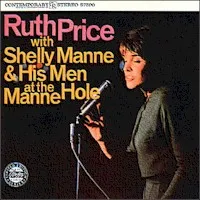Year: 2011
Time: 79:47
File: MP3 @ 320K/s
Size: 183,9 MB
Art: Front
(2:22) 1. Lullaby in Rhythm
(4:13) 2. East of the Sun
(3:25) 3. Steeplechase
(2:59) 4. Laugh Cry
(2:45) 5. At Last
(2:43) 6. You Stepped Out of a Dream
(2:38) 7. Yesterday's Gardenias
(2:50) 8. Bock's Tops
(3:08) 9. Don't Worry 'Bout Me
(2:54) 10. Backfield Motion
(3:02) 11. The Eye Opener
(2:42) 12. Bojangles of Harlem
(4:41) 13. It's a New World
(7:24) 14. Blues in the Night
(3:00) 15. The Party's Over
(3:42) 16. Joey, Joey, Joey
(5:07) 17. Woody's Dot
(3:38) 18. Namely You
(3:56) 19. Love in a Home
(3:47) 20. Progress Is the Root of All Evil
(4:00) 21. Independent
(4:41) 22. Invitation to the Blues
While other West Coast jazz pianists during the Fifties and early Sixties cut their shareand some perhaps more than thatof albums for a variety of recording firms, Russ Freemans output of records under his own name was nowhere near enough to reflect his enormous talent.
Thanks to his involvement in the groups of such standard bearers as Howard McGhee, Dexter Gordon, Art Pepper and Wardell Gray, he developed rapidly and when Chet Baker made his first quartet recordings in December 1952, he chose Freeman as pianist, composer and musical director. Freemans reputation also earned him a place with the Lighthouse All-Stars, Shorty Rogers Giants and, for ten years from 1955, with Shelly Manne and his Men.
This CD is dedicated to the memory of Russ Freeman (1926-2002), an extraordinary but too often underrated jazz pianist who deserves a place among the greatest.
Tracks #1-3, not issued on LP
Tracks #4-11, from Pacific Jazz LP-8 (10")
Track #12, from World Pacific JWC-501 (12")
Track #13, from World Pacific JWC-505 (12")
Track #14, from World Pacific JWC-502 (12")
Tracks #15-21, from World Pacific PJM-404 (12")
Track #22, from World Pacific JWC-511 and Stereo 1031 (12")
Personnel on #1-3: Russ Freeman (piano), Bob Whitlock (bass), Bobby White (drums). Recorded in Hollywood, at Gold Star Studios, December 15, 1952
Personnel on #4-11: Russ Freeman (piano), Joe Mondragon (bass), Shelly Manne (drums). Recorded in Hollywood, at Radio Recorders, December 27 (#4-6) & 28 (#7-11), 1953
Personnel on #12-14: Bud Shank (alto sax & flute), Russ Freeman (piano), Carson Smith (bass), Shelly Manne (drums). Recorded in Hollywood, at Music Box Theater, February 19, 1956
Personnel on #15-21: Russ Freeman (piano), Monty Budwig (assb), Shelly Manne (drums). Stu Williamson (trumpet, added on #18-21). Recorded in Hollywood, at Radio Recorders, August 12, 1957
Personnel on #22: Russ Freeman (piano), Billy Bean (guitar), Monty Budwig (bass), Mel Lewis (drums). Recorded in Hollywood, at Sound Enterprises, March 26, 1959




















